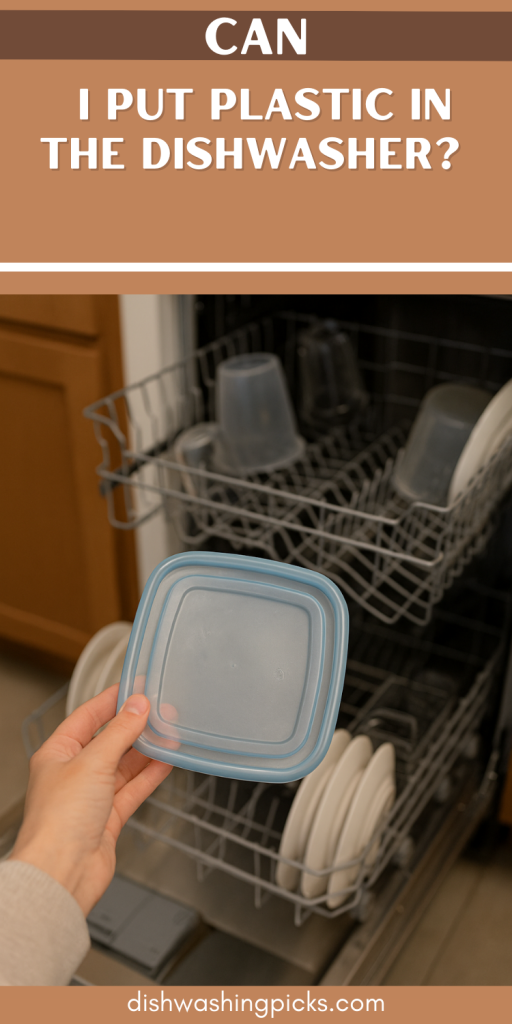Alright, let’s be honest — we’ve all stood at the sink, dirty plastic container in one hand, dishwasher door wide open, wondering, “Can I just throw this in there and hope for the best?”
You’re not lazy. You’re just… efficient. Right?
But here’s the thing — not all plastic is created equal. Some stuff can take the dishwasher heat like a champ, and other pieces? They’ll come out looking like they survived a microwave explosion. Warped, flimsy, half-melted… and suddenly your perfectly good Tupperware now resembles abstract art.
So, let’s break it down: when is it cool to dishwash plastic, and when is it a total no-go?
The Dishwasher-Safe Label: Your New Best Friend
Okay, rule #1 — always, always check the bottom of the plastic thing you’re about to clean. If it says “dishwasher safe”, you’re golden. If it doesn’t say anything? Eh… that’s where things get dicey.
Imagine this: You throw your favorite smoothie cup in the top rack, hit “start,” go binge-watch something, and then… bam. You open the door and the cup’s all twisted like it had a full-on panic attack. Not ideal.
Dishwasher-safe plastic is made to handle the heat, the spray, the drama. Anything else? Risky business.
Top Rack vs Bottom Rack: Yes, It Matters
Let’s get into the nitty gritty. If the plastic is dishwasher safe, that doesn’t mean you can just toss it anywhere. The top rack is your safe zone. That’s where the heat’s a bit gentler, so your plastic doesn’t end up soft and saggy.
Bottom rack? That’s where the heat hits hardest — right near the heating element. Plastic down there is pretty much signing up for a meltdown. Literally.
👉 So yeah — even if it can go in the dishwasher, keep it top rack only. Trust me, future-you will thank present-you.
Not All Plastic is Dishwasher-Friendly (Even if It Looks Tough)
Here’s a sneaky thing: some plastics feel sturdy. Like those takeout containers that seem super solid? You’d think, “These could totally survive the dishwasher, right?”
Wrong.
A lot of those are single-use plastics, and while they seem durable, they weren’t made to withstand high heat. They might go in looking fine… but come out a little warped, a little brittle, maybe with some mystery cracking going on. Not ideal for food safety, either.
👉 Golden rule: if it didn’t come with a dishwasher-safe label and you didn’t buy it as reusable kitchenware, hand wash it. It’s not worth the gamble.
What About BPA? Should I Be Worried?
Okay, let’s talk about that scary-sounding acronym you’ve probably heard a million times — BPA.
BPA stands for Bisphenol A, a chemical used in some plastics that can leach into food, especially when plastic is heated. Think: microwaves and, yep, dishwashers.
These days, a lot of new plastics are labeled BPA-free, which is great. But here’s the deal: if you don’t know for sure whether your plastic is BPA-free, it’s probably safest to avoid running it through high heat — including the dishwasher.
Don’t want those chemicals leeching into your leftovers? Yeah… me neither.
Real Talk: When Should You Just Hand Wash It?
There are moments when the dishwasher just isn’t worth the risk. Here’s when you should skip the convenience and roll up your sleeves instead:
- If the plastic feels super light and flimsy.
- If it doesn’t have any labels at all.
- If it’s really old (like, the kind of container that’s been living in your kitchen since college).
- If you’ve already seen signs of warping or cracking.
Sure, hand washing’s a bit of a drag — but it’s better than melting your favorite salad container into a sad little puddle.
Let’s wrap it all up:
- Yes, some plastic can totally go in the dishwasher — as long as it’s labeled dishwasher safe.
- Top rack only, always.
- No label? Don’t risk it.
- Reused takeout containers? Hand wash.
- Feeling unsure? You know the drill: better safe than sorry.
So next time you’re standing there, holding that smoothie cup and wondering, “Should I throw this in the dishwasher?” — now you know exactly what to look for.
And hey, if you forget once in a while and end up with a lopsided plastic bowl? It happens to the best of us. Consider it a rite of passage.

